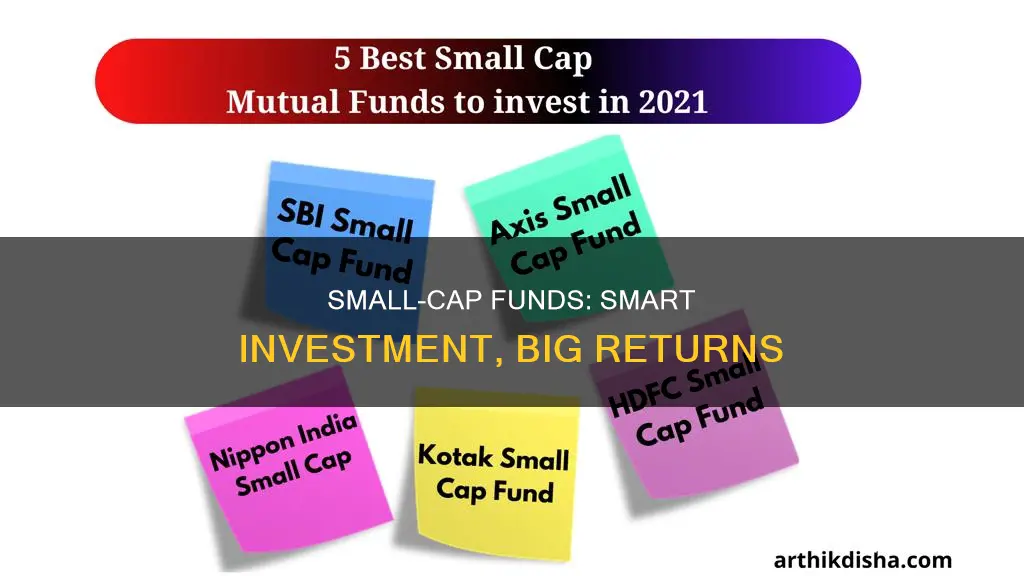
Small-cap funds are a type of investment fund that focuses on companies with a small market capitalization, typically ranging from $300 million to $2 billion. These funds offer investors the opportunity to get in on the ground floor with younger, smaller companies that have aggressive growth potential. While small-cap funds carry more risk than investments in larger, more established companies, they can also offer higher returns over the long term. Small-cap funds are best suited to investors with a high-risk tolerance who are willing to accept volatility in exchange for the potential of significant gains.
| Characteristics | Values |
|---|---|
| Market capitalisation | Between $300 million and $2 billion |
| Risk | Higher risk of losses |
| Returns | Higher returns |
| Volatility | More volatile |
| Growth potential | Higher growth potential |
| Investor type | Suited to investors with high-risk tolerance |
| Investment horizon | Long-term investment |
| Financial goals | Long-term goals, e.g. retirement |
What You'll Learn

Small-cap funds can be a good investment during economic recovery
Small-cap funds are a type of investment fund that focuses on companies with a small market capitalization, typically ranging from \$300 million to \$2 billion. These companies are often younger and seek aggressive growth, making them more volatile and vulnerable to market downturns. However, during economic recoveries, small-cap funds can be a smart investment choice for several reasons.
Firstly, small-cap funds have the potential to outperform other segments of the market during economic recovery. Historically, they have generated higher returns over the long term compared to large-cap and mid-cap funds. This is because small companies can rebound more quickly than larger companies in a growing economy. They have more flexibility and agility, allowing them to navigate the market and make decisions faster. As the economy recovers and demand picks up, well-managed small-cap companies may see upgrades in profitability, resulting in a positive impact on their stock performance.
Secondly, small-cap funds provide investors with an opportunity to get in on the ground floor of emerging businesses. Many successful large-cap companies started as small businesses, and investing in small-cap funds allows investors to get in early on the next big thing. Small-cap companies have more room to grow than their larger counterparts, and this growth potential can lead to significant returns for investors.
Additionally, small-cap funds are often overlooked by large mutual funds due to their size. This gives individual investors an edge over institutional investors. While institutional investors prefer the stability of large-cap stocks, small-cap funds cater to those seeking aggressive returns. By investing in small-cap funds, individuals can take advantage of the potential for higher returns that may be missed by larger funds.
It's important to note that small-cap funds are generally considered riskier investments than large-cap funds. They tend to be more volatile and susceptible to market downturns. Therefore, small-cap funds are best suited for investors with a high-risk tolerance and a long-term investment horizon. It's also crucial to carefully research and analyse small-cap funds before investing, as not all funds will perform the same way.
In summary, small-cap funds can be a good investment during economic recovery due to their potential for high returns, the opportunity to invest in emerging businesses, and the ability to navigate the market with agility. However, investors should be aware of the risks involved and ensure that small-cap funds align with their investment goals and risk tolerance.
Invest in Tesla: Top Mutual Funds to Consider
You may want to see also

They offer higher growth potential
Small-cap funds offer higher growth potential for several reasons. Firstly, small-cap companies are younger and have more room to grow than larger, more established companies. They are often bringing new products and services to the market or creating entirely new markets, which allows for significant growth potential that is unmatched by larger companies.
Secondly, small-cap companies can be more agile and navigate more precisely than larger companies. They have fewer layers of management and fewer potential obstructions, allowing them to make decisions about new products and services and how to bring them to market more quickly. This agility enables small-cap companies to rebound and grow more quickly during economic recoveries.
Additionally, small-cap companies typically raise capital by selling shares of stock, while larger companies borrow money by issuing bonds. As a result, higher interest rates have less negative impact on small-cap companies' ability to grow, as they are not heavily reliant on bonds to expand their operations and fund projects.
Furthermore, small-cap funds can provide individual investors with an edge over institutional investors. Institutional investors often prefer more stable large-cap stocks, while investors seeking aggressive returns may opt for small-cap funds. This gives individual investors the opportunity to get in on the ground floor of companies with high growth potential.
Lastly, small-cap funds tend to be composed of more small domestic companies, and during economic recoveries, they can experience a quicker turnaround and recovery than large-cap funds. This makes small-cap funds a smart long-term investment choice, especially during phases of economic growth.
Vanguard Traditional IRA: Best Funds for Your Retirement Savings
You may want to see also

They are ideal for investors with a high-risk appetite
Small-cap funds are ideal for investors with a high-risk appetite. They are suitable for investors who are willing to take on high risks and know when to exit the market. Small-cap funds are generally considered to be more aggressive investments than large-cap funds. They are more volatile and vulnerable to losses during downturns in the market. This is because the companies that small-cap funds invest in are younger and seek to expand aggressively.
Small-cap funds are also more susceptible to volatility due to their size. It takes less volume to move prices, and it is common for the price of a small-cap stock to fluctuate by 5% or more in a single trading day. This volatility can be advantageous, as small-cap funds can rise in price more quickly than large-cap funds during economic recoveries. However, it also means that small-cap stocks can see larger declines in price during recessions.
Small-cap funds are best suited for investors with a long-term investment horizon, typically considered to be at least five to ten years. This allows investors to ride out the volatility and benefit from the potential for higher returns over the long term.
Additionally, small-cap funds offer the opportunity for exponential growth. They invest in smaller companies that have more room to grow. As a company grows, its stock price typically increases as well. Therefore, investing in a small-cap fund provides the potential for higher returns compared to large-cap funds.
In summary, small-cap funds are ideal for investors with a high-risk appetite as they offer the potential for higher returns, but also come with increased volatility and the possibility of larger losses. Investors considering small-cap funds should carefully evaluate their risk tolerance and ensure they have a long-term investment horizon.
Closed-End Funds: Registered Investment Companies Explained
You may want to see also

They are suitable for long-term financial goals
Small-cap funds are suitable for investors with long-term financial goals. They are a good option for those who are willing to take on higher risks and have the patience to wait out market downturns.
Small-cap funds are known for their exponential growth potential. They invest in younger companies with lower total values, which have more room to grow than larger, established companies. This means that if you invest in a small-cap fund and the company grows, you could make a substantial profit.
However, it is important to remember that small-cap funds are volatile and vulnerable to losses during market downturns. They are also more susceptible to fraud and internal issues that can destroy shareholder interest. As a result, small-cap funds are best suited for investors with a long-term investment horizon, typically considered to be at least five to ten years. This allows investors to ride out the ups and downs of the market and benefit from the potential growth offered by small-cap companies.
Additionally, small-cap funds are a good choice for investors who want to take advantage of price fluctuations. During recessions, small-cap stocks tend to see larger declines in price, but during economic recoveries, they can also rise in price more quickly than large-cap stocks. This makes small-cap funds a strategic choice for investors who want to maximise their returns by buying more shares during market corrections.
In summary, small-cap funds are suitable for long-term financial goals because they offer the potential for significant growth over time. However, due to their volatile nature, investors should be prepared to weather market downturns and accept a higher level of risk.
Gold Mutual Funds: Best Investment Options for You
You may want to see also

They can be a good investment for those who know when to exit the market
Small-cap funds are a good investment for those who know when to exit the market. They are suitable for investors who are willing to take on high risks and can recognise when to sell their holdings.
Small-cap funds are a risky investment option. They are volatile and vulnerable to losses during market downturns. They are also susceptible to higher volatility due to their size. This means that the price of a small-cap stock can fluctuate by 5% or more in a single trading day. Therefore, investors need to be able to tolerate sharp ups and downs in the market.
Knowing when to exit the market is crucial for maximising returns and minimising losses. While timing the market is challenging, investors can look for clues in market and economic trends. For example, investing when the market has been down for a long period, as indicated by extreme pessimism in the media, can be a strategic move.
Additionally, investors can consider investing in small-cap funds through a Systematic Investment Plan (SIP). SIP involves investing a fixed amount in a mutual fund at regular intervals, which helps to average the purchase cost over time. This strategy can help investors benefit from market volatility and reduce the impact of timing the market.
In summary, small-cap funds can be a good investment for those who understand the risks, monitor market trends, and know when to exit their positions.
Bond Index Funds: Choosing the Right Investment for You
You may want to see also
Frequently asked questions
The "cap" in "small-cap" refers to a company's market capitalization, which is the total value of the company as measured by adding together all of the shares at their current prices. Small-cap companies are generally defined as those with a market capitalization between $300 million and $2 billion.
Small-cap stocks may offer more opportunities for investors seeking capital gains as they have more room to grow. As a company grows, its stock will likely grow too. Therefore, picking the right company to invest in could result in higher returns compared to large-cap stocks.
Some advantages of investing in small-cap funds include exponential growth potential, availability at a lower price, and higher returns over the long term. Small-cap funds also give individual investors an edge over institutional investors.
Small-cap funds are suitable for investors with a high-risk appetite who are willing to tolerate volatility and are seeking aggressive growth. These funds are also ideal for those with long-term financial goals.







